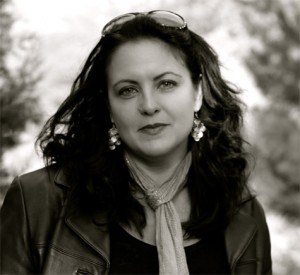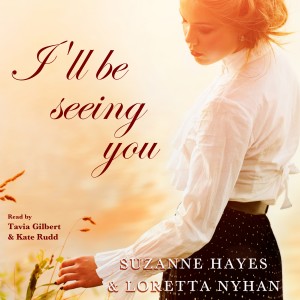A conversation with Suzanne Palmieri (writing as Suzanne Hayes) and Loretta Nyhan, co-authors of I’ll Be Seeing You
Audiobook narrated by Tavia Gilbert and Kate Rudd comparateur prix viagra.
Ideal: I’ll Be Seeing You is the story of two women who become pen pals – and a lifeline for each other – on the home front during World War II. Loretta and Suzanne, the two of you hadn’t met when you wrote the book, and you decided to write this book together in the form of letters from the two women to each other. How did this come about?
 Loretta: Suzy and I met online through some writer friends’ blogs. We started commenting on each other’s blog posts, which led to sharing and critiquing each other’s work. When we both had other projects on submission with publishers, we were driving ourselves crazy with worry and stress. Suzy said, “Let’s write something just for ourselves, for fun” and she sent me that first letter you see in the book. She sent it in character, with no explanation. I was blown away. About five minutes after she sent it, Rita showed up, a fully formed character. I know that sounds a little woo-woo, but sometimes magic just happens. I wrote back to her immediately (that’s the second letter you see in the book—the first two letters are pretty much unedited).
Loretta: Suzy and I met online through some writer friends’ blogs. We started commenting on each other’s blog posts, which led to sharing and critiquing each other’s work. When we both had other projects on submission with publishers, we were driving ourselves crazy with worry and stress. Suzy said, “Let’s write something just for ourselves, for fun” and she sent me that first letter you see in the book. She sent it in character, with no explanation. I was blown away. About five minutes after she sent it, Rita showed up, a fully formed character. I know that sounds a little woo-woo, but sometimes magic just happens. I wrote back to her immediately (that’s the second letter you see in the book—the first two letters are pretty much unedited).
 Suzanne: So I’m doing my laundry and I’m thinking about waiting. Because the waiting part of the process is really hard. When you write a book, you are sort of in control until that moment. When the agent has that book out with publishers you realize that the next call or email will be THE ONE. And I can’t stand notbeing in control. So I called Loretta, and we were commiserating about the whole thing. SO I say, “Hey, while we wait, we should do a writing exercise. We should take control of our inboxes. Let’s write to each other in character and see what happens!” So I sent an email as Glory that day. And she sent one back as Rita, and I’ll Be Seeing You was born!
Suzanne: So I’m doing my laundry and I’m thinking about waiting. Because the waiting part of the process is really hard. When you write a book, you are sort of in control until that moment. When the agent has that book out with publishers you realize that the next call or email will be THE ONE. And I can’t stand notbeing in control. So I called Loretta, and we were commiserating about the whole thing. SO I say, “Hey, while we wait, we should do a writing exercise. We should take control of our inboxes. Let’s write to each other in character and see what happens!” So I sent an email as Glory that day. And she sent one back as Rita, and I’ll Be Seeing You was born!
Ideal: I love that! And it was such a compelling beginning!
Suzanne: I wanted her to write back!! So I tried to make it as compelling as possible! It worked! Since it was such a nerve-wracking time in our lives, I wanted to situate myself in a place where I felt the most peace. When I was growing up, my mother took me to her best friend’s family summer house in Rockport, Massachusetts. The house was much less grand (but more grand in some ways) than Glory’s house, but it was where I spent the best growing up time. The town, the beaches, the “Rocks” the private road, the people. I used every memory I had so I could spend time there in my mind.
Ideal: Did you both allow the plot to unfold as you went, or did you stop at some point and start plotting it out together?
Loretta: About ten letters in, Suzy wrote something that I thought might be problematic. It was the first time we realized we needed to work out the major events/plot points, and compromise if our visions didn’t match. Together, we decided the general character arcs, though we decided to keep how we would get to those points to ourselves. We wanted to surprise each other, because then our characters would react from the heart. We also never broke character when sending the letters. The subject line would post the date—December 12, 1944, for example—and the text of the email would contain only the letter. Staying in character helped with the writing, and made everything move quickly. We began the book on Valentine’s Day, 2011 and finished on the 4th of July.
Suzanne: Other than that, we talked a LOT about NOT plotting it. It wasn’t until we actually had an editor that we began talking about plot. Wait…no…it was when our agents got involved, right before submission, but really, they didn’t change plot. It wasn’t until the first real edit with Harlequin MIRA that we had to hash out some ideas. So what you get in the novel is really quite close to the original book.
Ideal: Were there things that shocked and surprised you in the reading of each other’s chapters, or could you sense certain things coming?
Loretta: Oh, there were things that absolutely shocked me! My fingers would be shaking as they hovered over the keyboard! I think I shocked her, too. I know when a character died, she called me and we sobbed together as though someone in our family had actually passed away. Okay, we’re a little weird, but it felt so real!
Suzanne: It was the surprise that kept us going. I found myself running home and opening my computer to check my email. Like waiting for that letter and ripping it open. In many ways, though fiction, it was a very real correspondence. Perhaps the most shocking thing was how much we both believed in it, and how with little or no real reason to keep going, we did. It was so much fun. An absolute joy.
Ideal: I’m wondering if other surprises came up for you in the process. Did you find that this method of writing, and the shared inspiration, changed the way you worked going forward?
Suzanne: I’d say it gave me the courage to trust myself. No matter what. And to keep writing things that gave me peace and joy. Not to worry over sales or anything. I think it validated both of us in terms of our creative spirit.
When I got the email about the death, I’ll never forget my response. Not shocked…but so very sad. And I sat down and wrote that whole series of letters to Rita in one sitting. And then we talked and cried. Those letters are almost word for word the original letters from our first correspondence. That’s the thing I think I learned. To write from the gut and soul and pour out whatever onto the page. To trust that process.
Loretta: A good number of surprises came up during our exhaustive research. I’m a history nerd, and the more I discovered about the wonderful people of Iowa during the war, the more I felt obligated to do right by them. Suzy and I aren’t historians, but we felt a huge responsibility to our characters and to the real life folks who inspired them. We would surprise each other with the construction of our worlds, if that makes sense. The Rockport setting seemed so fully formed to me – picturing it, and Glory’s role in it, made it easier to respond as Rita. We were in charge of our own worlds – she had Rockport, I had Iowa City, so part of writing to each other involved creating a world the other could believe in.
We also learned that compromise in a writing partnership is vital, as is open communication. If something wasn’t working, we talked it out until we were both satisfied.
Suzanne: I think the difference in our personalities is really important. Loretta is far more organized than I am. I’m very eager to delete things and make changes on the fly and things like that. Loretta kept the book safe from me, in a lot of ways. I mean that. She guarded the narrative especially through the editing process. I mean, I would have taken the whole thing to France and made the Can-Can girls if someone said it might work… because I’m flighty and chaotic. But Loretta has been the champion of the integrity of that process from the start. And I adore her for it.
Ideal: At what point in the process did you meet in person?
Loretta: We met one week after publication! The meeting took place in a small indie bookshop in the Village in NYC. I brought sunflowers. We were nervous–what would it be like? But then we went out to lunch together and just talked. It was an exciting time.
Suzanne: I remember asking Loretta if we might feel some kind of way, you know, because we are Suzy and Loretta, not Glory and Rita. We were both convinced this wouldn’t be an issue. And it wasn’t an issue! Because there is so much Glory in my personality (the flighty, dramatic one), and a lot of Rita in Loretta (the pragmatic, value-driven one). It was a meeting of the minds.
Ideal: How did you choose the time period? Had you done research into the WWII era previously, or did you research as you went, uncovering ideas for your characters along the way? Or did you have a sense of the time period already from grandparent stories?
Suzanne: I chose WWII because Loretta and I had already done a lot of research when she was helping me with the 1940’s scenes in my first Palmieri book, The Witch of Little Italy. We’d shared our passion for the era many times, so it seemed like the most likely place to be. Besides, who doesn’t want to be able to travel back in time? 🙂
I’m not a historian but I am a full time history teacher. Also I think, more than the history teacher angle…I’m just a really curious person. I never liked school, and didn’t do well until I figured it out (MUCH LATER ON) but that curiosity is so alive in me and that’s why I’m a teacher.
Loretta: I’ve always been a history buff, and my father is an amateur/expert in military history. Our research was immersive and intense, but I did have a general knowledge of the major battles and popular culture of the time.
Unfortunately, my grandparents died when I was relatively young, but I had an “adopted” grandmother who lived across the street. She moved to Iowa during the war to live with her husband’s family while he was overseas. Later, I learned he was in the same battalion as Sal. Her daughter gave me his battalion shield when the book was published, which meant a great deal to me.
Ideal: Wow I just got chills! That’s pretty amazing. Did you consciously put elements of your neighbor into Rita, or did she just show up?
Loretta: No. I don’t know where Rita came from. She’s not me, and she’s not anyone I’ve ever met. It was strange how that happened! I felt like I understood her, though, and, as a mother, I could definitely relate to her worries. I tried to imagine if my sons were sent overseas, with no Skyping or Facebook or any way to know whether they were alive or dead. It was very sobering to imagine, to say the least.
Ideal: And I love that Rita was exactly the friend Glory most needed in her life (and vice versa). These characters felt so real to me. How autobiographical is your writing? Do you infuse elements of your life and personality or of those you know?
Suzanne: Oh my. YES. I’m probably the most dangerous writer that way (like, you’ll end up in a book… that kind of danger!). I have been asked to write a memoir, (because of the crazy pants life I’ve led so far) and I said, “Read all the books. They are the best you will get!”
No matter if I’m writing as Hayes or Palmieri, my characters are always lost. They always have the story arc of finding their way to themselves through themselves. They always need a home. Orphaned in one way or another. They are strong, but that can be a weakness. I find that no matter who I write about, or how I write, or when it takes place, or if it has magic or not…I can somehow connect with readers because of my obsession with inner thought and atmosphere and truth. Honesty is the most important thing, when writing.
Ideal: what was your favorite part of working on this book?
Loretta: I’ve been writing my entire life, and I expect to be writing for many years in the future, but I have never had (and probably will never have) a writing experience like I’ll Be Seeing You. Sometimes, a book feels like it is writing itself, and you’re really just a typist – that’s how I felt with this. Almost as if Suzy and I were transcribing these stories. I love these characters so much–they felt real to me, and still do.
My favorite part of the whole process was writing the final letter. It wasn’t part of the original draft, and when our editor, Erika Imranyi at Mira, suggested it would be nice closure, I procrastinated until I couldn’t anymore. Finally, I sat down to write it, and it came out of me in an emotional rush. I’ll never forget it. I cried when I read over what I’d typed. I almost couldn’t believe I’d written it.
Ideal: Is there anything else we haven’t covered that you’d like to share with listeners?
Suzanne: One very important thing: The tomato soup cake is delicious. Really. 🙂
Loretta: We are so grateful for the reception this book has gotten, particularly from people who actually lived through that era. I always hold my breath when approached by someone who lived through the war after they’ve read our book. Luckily, they’ve all said we got it right. For someone who writes historical fiction, that makes my heart burst.






